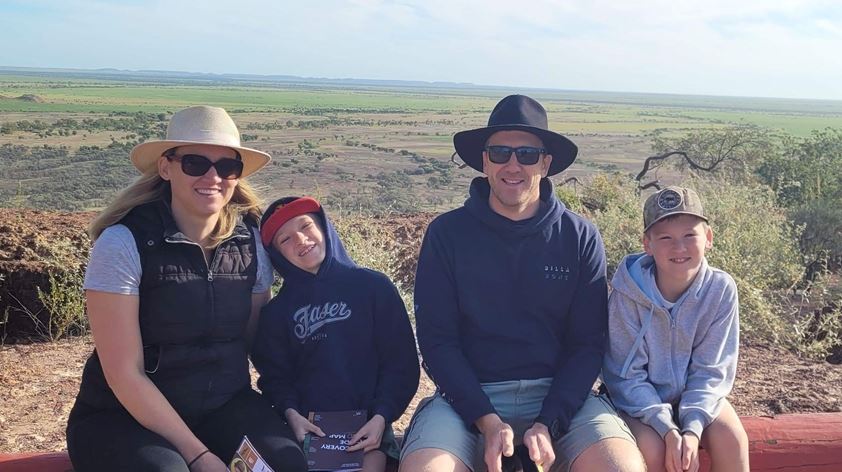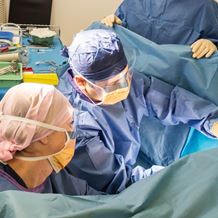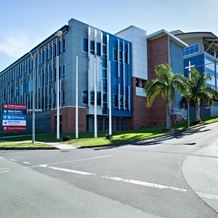Matt's shock journey from young, fit, healthy dad to stage three bowel cancer diagnosis
St Vincent's Private Hospital Northside
One week, 41-year old doting dad Matt Fletcher was a normal, healthy man running around with his two young boys kicking a soccer ball on their home on acreage north/west of Brisbane. The next week he was struggling with severe abdominal pain which soon intensified … just days later Matt was undergoing major emergency surgery at St Vincent’s Private Hospital Northside and was told he had stage three bowel cancer!
“It was a complete and utter shock to my wife and I, as I’d been active and healthy to that point with no real family history of bowel cancer. It just goes to show that you’re never too young to get bowel cancer,” says Matt.

Bowel cancer is the deadliest cancer for people aged 25-44 and leading colorectal surgeon Dr Jayson Moloney, says the rapidly rising rates among young people in Australia (and around the world) is “the colorectal health challenge of our time.”
Dr Moloney is a colorectal surgeon and gastrointestinal endoscopist consulting and operating at St Vincent’s Private Hospital Northside in Brisbane and Matt Fletcher is his patient.
Every year, over 1500 young Australians die from bowel (also called colorectal) cancer. Australia has one of the highest rates of bowel cancer in the world.
It’s the sixth leading cause of death for Australians in this age group and Dr Moloney says it’s time to shatter the common misconception that bowel cancer is an ‘old person’s disease’.

Dr Jayson Moloney
“Being young doesn’t make you immune from bowel cancer - the numbers don’t lie and they paint a stark and graphic picture that tells us that more and more people under the age of 50 are being diagnosed. It’s now around 1 in 9 of all bowel cancer diagnoses,” says Dr Moloney.
He says Australian data (from the Australian institute of Health and Welfare) shows that while the overall incidence of bowel cancer is decreasing in the general population, the rise in the younger demographic is dramatic with a 134% increase in the 20-34 age group and a 32% increase in the 40-49 age group between 2005-2021.
“One of the big problems with the younger group is that in many cases there’s no symptoms or the symptoms can appear minor – which was the case with Matt in the first few days. So, it can sneak up on many people and that amplifies the shock for them and their family when there is a cancer diagnosis,” says Dr Moloney.
He says there’s no clear reason why the rate of bowel cancer is rising among younger Australians.
“The main risk factors that we believe can contribute to it are diet, obesity, smoking, excessive alcohol consumption and a sedentary lifestyle,” he says. “It’s likely to be a combination of factors. There could also be environmental factors which we don’t know or understand yet. That’s the unnerving thing - we just don’t know for sure despite all of the advances in medical science.
“Another significant risk factor is family history and whether a relative has had a bowel cancer diagnosis. So, it’s important to enquire in your family and understand if there’s any history there, although the information about relatives and cancer can sometimes be hard to find and it’s not always a topic which people are completely comfortable in speaking about.”
For Matt Fletcher, those risk factors were minimal: there was some red meat in his diet and moderate alcohol consumption, along with the suggestion that a great grandfather had died of bowel cancer many years ago.
“I had no reason to suspect that I was a candidate for bowel cancer. The first signs that something was amiss was towards the end of April when I had constipation for about a week and mild pain, at which point I saw my GP,’ says Matt.
“But over the next week it got progressively worse to the point where the pain was excruciating - a 9 out of 10 – and my wife drove me to the emergency department where they treated me with laxatives and suppositories for what they thought was a bowel blockage.

Matt Fletcher

Matt Fletcher with his two children
“When that didn’t work after a day, they did a CT scan which showed a significant blockage and I was transferred to St Vincent’s Northside and was referred to Dr Moloney. He reviewed the scans and told me I would need emergency surgery and said it ‘could be nothing major’ or there was a chance it could be cancer!
“It wasn’t until three very hazy days after the surgery, once they had done biopsies, that Dr Moloney visited me at St Vincent’s Hospital and told us that it was cancer. It was a real shock and very upsetting at the time for my wife and I. We did share the news with our boys, who are aged 10 and 12, and explained to them what they had found, but said that the cancer was now gone.
“Of course, you go looking for answers and wonder – ‘Why me’ and ‘What did I do to get cancer’ but as Dr Moloney explained, cancer can be totally random. It’s not selective and you have to accept that it wasn’t necessarily what you did, that it was just ‘your turn to draw the short straw’. You count yourself lucky for the good life you’ve had so far plus the fact that it was detected when it was, means I’m luckier than others.”
Dr Moloney says it was fortunate that he was able to operate before Matt developed any major complications such as a bowel perforation.
“Matt’s tumour was obstructing his bowel which meant I had to remove all of his large bowel and part of his small bowel. We were able to re-join the bowel and he avoided the need for a colostomy bag,” he says. “His case highlights the current trend of increasing rates of bowel cancer in younger patients, and the fact that bowel cancer can often have no symptoms or very subtle symptoms.
“Symptoms such as bleeding or trouble with your bowels are not normal. There may well be a simple explanation, but it’s so critical to have a conversation with your GP about your symptoms and your risk of bowel cancer. You should feel comfortable to request a referral to a specialist for a colonoscopy if you’re worried.”
Dr Moloney says the tragedy of the rising rates of bowel cancer among younger Australians is that they have the most to lose (given their youth) and the most to gain - given that if it’s detected early, the good news is that the vast majority of bowel cancer cases can be treated successfully when detected early.
“We have a definitive way to detect the disease when it’s pre-cancerous by doing a colonoscopy. So, we should have much lower rates of bowel cancer and lower mortality rates given that it’s preventable, detectable and treatable,” he says.
As Matt embarks upon six months of chemotherapy, he has happily become a champion for spreading the message of vigilance, screening and early detection. Aiding his very personal campaign, is the fact that the Federal Government is lowering the age for the free national bowel cancer screening home test kit.
As of July 1, it will be lowered from age 50 to 45, and people will be able to join the program by requesting their first bowel screening kit at the www.ncsr.gov.au/boweltest or by calling the National Cancer Screening Register on 1800 627 701. All eligible people aged 45 to 74 can also ask their doctor about getting a free test kit and people aged 50 to 74 will continue to receive a bowel cancer screening kit in the mail every two years.
“I feel like I can make a difference in raising awareness given what happened to me. And in fact at my work, I know of at least 10 people who have booked in for colonoscopies after hearing of my story and my family are also now super vigilant and my sister is also having a colonoscopy,” says Matt. “My other message to people is ‘Don’t ignore any symptoms and if there’s changes in the way your body feels or functions, see your GP and get it checked out – it just could save your life’.”
- Home
- Patient News
- Matt's shock journey from young, fit, healthy dad to stage three bowel cancer diagnosis




